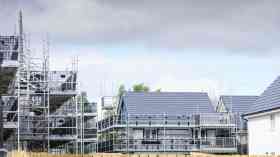Buyers paying more for homes with low-carbon technology
With energy prices rising, new analysis from Savills has revealed that home buyers are paying significantly more for homes with low-carbon technology.
Revealing the disparity between how homes are heated in rural and urban locations, and across different house price bands, Savills survey of home buyers revealed that 71 per cent of respondents consider EPC ratings to be important in their decision making, with almost a third stating that they place more importance on EPC ratings than they did a year ago.
With newer, cleaner, methods of energy demanding a higher price tag, 59 per cent of respondents said that they would be willing to pay more for a home if at least 75 per cent of a property’s energy was powered by renewable sources.
Properties utilising community heating schemes demand the highest average prices (£550,673), followed by homes supplied by heat pumps (£483,935). This is closely followed by homes that use oil (£419,490), which is likely driven by larger country properties that have oil Agas fitted.
Heat pumps are predicted to become the main source of low carbon heating for new homes, as the government sets out ambitions of installing 600,000 heat pumps a year by 2028.
Lawrence Bowles, Savills residential research analyst, comments: “It’s no great surprise that the vast majority of homes still use mains gas heating, but faced with increasing energy prices, homes that offer more cost-efficient monthly alternatives – such as homes with heat pumps – are climbing higher up buyers wish lists when searching for a new home.
“However, our analysis shows that more environmentally friendly heating methods such as heat pumps and community heating systems are most prevalent in higher-value areas. As such, in many areas housing values would not necessarily support the investment in newer and cleaner forms of heating.
“It also highlights the enormous challenge set by the zero-carbon agenda targets and the uphill battle ahead that we face. While government subsidy will undoubtedly go some way in supporting people to reduce their homes’ environmental footprint, more resources and investment is needed to significantly reduce our reliance on fossil fuel heating.”







